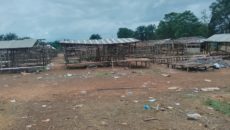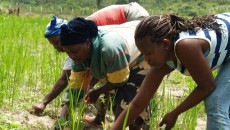HARPER, Maryland – After providing threshers to two farming groups in Maryland, the Smallholder Agricultural Productivity Enhancement and Commercialization Project has provided four rice mills to farmers in Grand Kru, Grand Gedeh, Maryland, and River Gee.
The rice mills were made available through the support of Africa Rice, following a nine-day workshop that brought together 22 farming stakeholders from the counties to learn to manage and operate the mills.
SAPEC’s mechanization specialist, Jean Moreira, said each mill cost at least US$65,000 and were provided following an assessment that suggested the need to empower local farmers as a means of enhancing food sufficiency by increasing production. He said each of the mills can process up to 18 tons of rice a day.
Moreira encouraged farmers in the four counties to remain organized and work with the Ministry of Agriculture and make adequate use of the equipment to reduce poverty and food insecurity and boost agricultural activities.
SAPEC is currently present in 12 of the 15 counties, Moreira said, but the high cost of the rice mills could not allow the project to deploy the equipment in all project counties. The program previously installed a large capacity rice processing equipment and provided power tillers to promote local rice production in Maryland.
“The impact is going around the value chain of rice production to increase food security in the country,†he said.
“But at the same time, we are providing other technologies that include small rice mills, parboiling equipment, grinders, and threshers to the other counties.â€
He hopes that by the end of the training workshop, participants would become knowledgeable in operating the machines and will use the knowledge to efficiently manage them.
A machinery engineer of the Ministry of Agriculture, Roosevelt Reeves, also noted that the nine-day workshop provided opportunities for local farmers and young entrepreneurs in the southeast to learn new technologies that can increase their incomes.
Reeves said the government Pro-Poor Agenda for Prosperity and Development hopes to make the country self-sufficient in food production by 2023.
“Instead of us continuously spending our money outside, we can start to feed ourselves in making the efforts to grow our rice here,†he said.
“If this is done, it will address key things including hunger, dependency syndrome, and poverty but [it’ll] require concentration and commitment.â€
Maryland’s county agriculture coordinator, Christian Nah, said he was impressed that those trained to manage and operate the rice mills all came from southeastern counties.
“Everyone that was trained came from the southeastern counties. Again, they should go back to their various counties and train others who were not part of the training,†Nah said.
He also outlined that there were several challenges affecting agricultural activities in Maryland, including the lack of other more productive varieties. He noted that nearly 80 percent of the farmers are engaged only in upland rice production.
Nah encouraged farmers to diversify their activities and including lowland rice production, which could provide harvests up to three times a year. He said such activity would double annual production.
Maryland’s assistant superintendent for development, Robin Scott, also attended the workshop, along with representatives from the Central Agricultural Research Institute, the Ministry of Agriculture, and local officials from the southeastern region.
Featured photo by Franklin Nehyalor



